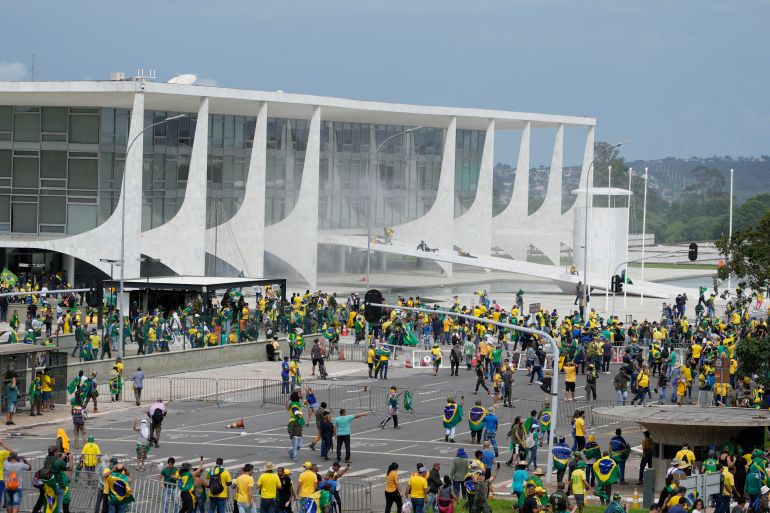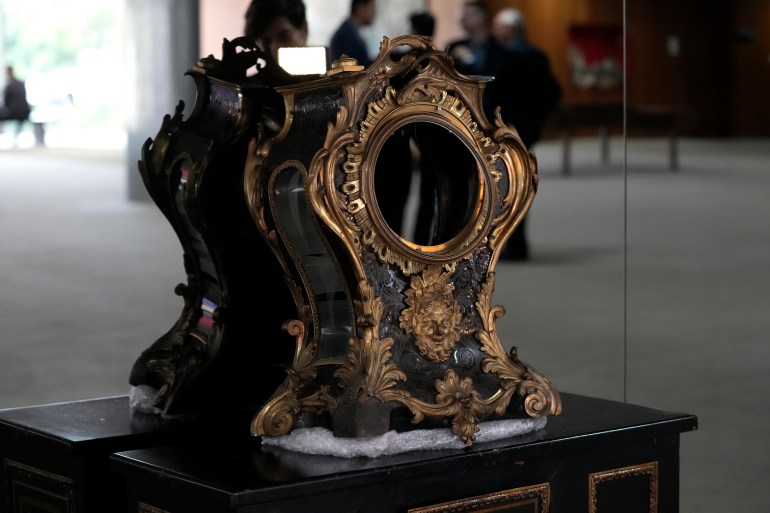Brazil moves forward with riot investigation after capital attack
Brazilian authorities have launched a probe to discover who financed the far-right effort to overturn the 2022 election.

Sao Paulo, Brazil — In 1808, the king of Portugal, John VI, arrived on a visit to what was then colonial Brazil with a large, ornate pendulum clock, a gift from King Louis XIV of France.
That artefact has been in possession of the Brazilian state ever since, displayed in the Planalto presidential palace for the last 11 years.
Keep reading
list of 3 itemsBrazil top court to investigate Bolsonaro role in anti-Lula riots
Former Bolsonaro justice minister arrested over Brazil riots
But on January 8, surveillance cameras inside the Planalto palace captured a man throwing the priceless work of art to the floor, destroying it beyond repair.
That individual, one of hundreds of rioters who stormed the seat of government in the federal capital Brasília that day, was wearing a black T-shirt emblazoned with the face of Brazil’s former far-right President Jair Bolsonaro.
Now, more than a week on, Brazil is still, quite literally, picking up the pieces. Investigations are under way into the perpetrators of the riot, who organised it and where the money came from.
The attack began when riled-up pro-Bolsonaro supporters forced their way past police cordons and into Brazil’s Congress, Supreme Court and Planalto palace, all located adjacent to one another.
They demanded a military coup d’etat to annul the results of the 2022 presidential election and reinstate the defeated Bolsonaro as president.
With the judiciary and legislature on holiday — and newly inaugurated left-wing President Luiz Inacio Lula da Silva out of town — the buildings were largely empty. No casualties resulted from the attack.
The damage to public property, however, was unprecedented, as vandals tore through the buildings, breaking windows, destroying priceless works of art and daubing far-right slogans on walls.
Almost 1,400 people were arrested following the attack and remain in police custody. On Monday, federal prosecutors indicted 39 of them for crimes including armed conspiracy and attempted coup d’etat. Dozens of further indictments are expected.
Senators have promised an inquiry to find out who financed the riots.
“There is clearly a well-funded core of support for a right-wing political agenda,” said Andre Pagliarini, assistant professor of history at Hampden-Sydney College. “And it is willing to invest in anti-democratic organising, even in the wake of electoral defeat.”
Mario Sergio Lima, a senior Brazil analyst at the Medley Advisors consultancy, said he believed that the riots were largely bankrolled by “mid-level retail and agro magnates”, a constituency that firmly backed Bolsonaro before the election.
Bolsonaro spent part of his time in office casting doubt over Brazil’s fully electronic voting system — a system that has yet to receive a single credible fraud accusation in its 27 years of use. On multiple occasions, he suggested he would not accept defeat at the ballot box.
In October’s run-off election, the far-right former army captain lost to Lula by a narrow margin of just more than two million votes. After the results were announced, Bolsonaro maintained a period of public silence. To this day, he has not explicitly conceded defeat.
But Bolsonaro supporters took to the street in support of the outgoing president, blocking major highways and calling for a military coup.
Bolsonaro himself left the country on December 30, a week before the attack in Brasilia. He has been staying in a rented home in Florida, in the southeast United States.
In the wake of the January 8 attack, Brazil’s Federal Police said they found a draft decree at the home of Anderson Torres, former justice minister under Bolsonaro.
It called for a military-led committee to “analyse the integrity of the presidential election”. If enacted, it would have also put the capital under a state of emergency.
Torres, who has been arrested, has claimed he received the document from a member of the public and that it was being taken out of context. But critics have decried the document as evidence of a far-right putsch.
“I find it hard to imagine a coup would have moved forward without US support,” said Pagliarini, the history professor at Hampden-Sydney College. “If Donald Trump were in the White House, the situation almost certainly would have been very different.”
The riot came as a baptism of fire for the nascent Lula government. But Pagliarini believes the attack may ultimately weigh in Lula’s favour.
“You could argue this is the last thing Lula would want at this early stage of his administration,” Pagliarini said. “But there is opportunity in this emergency.”
“Lula’s great skill is being able to mediate between divergent perspectives, creating a unifying consensus from apparently irreconcilable interests. If he can show that to Brazilians in this turbulent context, he might remind them of his singular position in the nation’s politics.”
Brazil analyst Mario Sergio Lima, meanwhile, called Lula’s decision to quickly announce a federal intervention into Brasilia’s public security apparatus “a masterstroke”.
“He could have easily brought the military in, but that would have empowered them,” Lima said, alluding to the fact that Bolsonaro kept close ties to the military. Indeed, the list of those arrested for involvement in the riot contains more than a dozen active and retired military personnel.
The analyst added that the situation could even hand Lula greater support in Congress.
“I’m not saying he’ll have a massive ruling coalition, but most politicians, even from the opposition, will look to distance themselves from Bolsonaro,” Lima said.
From a global standpoint, FGV international relations professor Oliver Stuenkel said that an overwhelming majority of world leaders have shown solidarity with the Lula government and its efforts to prosecute the rioters, out of fear that similar attacks could occur elsewhere.
“The international reading of this is that, the more rigorous the response from Brazilian courts, the less risk there is of the January 8 attacks inspiring similar movements in other countries,” Stuenkel said.
